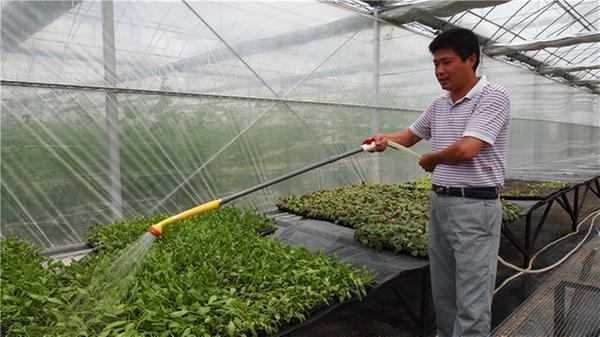Devoted husband reaps rewards from gardening

Editor's note: In the run-up to the 19th Communist Party of China National Congress, China Daily sent six reporters to villages nationwide to live for a month and take a look at how people are working under China's poverty eradication plan.
 |
| Zou Yongcun waters plants in a greenhouse in Gufang village in Huichang county, Jiangxi province.[Photo by Zuo Zhuo/China Daily] |
Villager who spent his life savings on medical treatment for his wife pulled his family out of poverty through greenhouse management
In the early 1990s, Zou Yongcun was a typical village youth. He was ambitious and couldn't stand life in the countryside, so he migrated to major cities in search of employment.
Almost three decades later, he is back where he started-Gufang, a village in the south of Jiangxi province-although he now sees the countryside as somewhere he can realize his dreams.
As a 20-year-old, Zou left home bound for Guangzhou, capital of Guangdong province, where he found a job at a clothing factory earning 100 yuan ($15) a month. He was a quick learner and a hard worker, and it didn't take long before he became a manager, which came with a monthly salary of 5,000 yuan.
His wife, Lan Zhaolian, had a job that paid 1,000 yuan a month, which meant the couple were able to enjoy a comfortable life in the city.
But fate had other plans. In 2007, Lan was diagnosed with systemic lupus erythematosus, an autoimmune disease.
"Back then, I was in pain from head to toe. I couldn't move and felt tired all the time. I couldn't even hold chopsticks to feed myself," Lan recalled, saying her husband took care of her and did all the chores, from laundry to cooking to washing her hair.
"I would have died if it wasn't for him," she added.
The hospitals in Guangzhou were too expensive for the couple. Zou had to give up his career and accompany his wife back to their home village so she could receive treatment. They spent more than 200,000 yuan, which was all their savings, on medical treatment, which left them in dire poverty.
They were in debt and struggled financially for many years. The only comfort was that Lan was getting better, though she was still too weak to work.
At the end of 2014, they were registered as a family living below the poverty line-annual per capita income of 3,146 yuan-which meant they were eligible to receive financial support from the local government. That year marked the beginning of a poverty alleviation campaign in the village.
Local officials did more than just support them financially. Last year, they invited Zou to join an agricultural cooperative and assigned him the role of greenhouse manager, as part of a plan to develop rural industries, including growing fruits and vegetables, and fish farming.
He was sent to Jiangsu province to learn how to cultivate crops without the use of soil, and greenhouse gardening. After 10 days, he returned with advanced knowledge of soilless culture and helped set up 11 greenhouses in the village.
With new technology came new challenges. "Pest control and humidity management can be tricky. I'm still learning, either by studying online or consulting experts," Zou said.
The greenhouses are now home to a variety of fruits and vegetables, such as baby cucumbers, cherry tomatoes and watermelons. Zou is proud of his work. "When we harvested the first batch of baby cucumbers, it was a huge success. They sold like hot cakes, with the price climbing as high as 20 yuan per kilogram," he said.
With a monthly wage of 2,000 yuan, Zou had pulled his family out of poverty by the end of last year, and he expects to see returns grow in the coming years having invested 300,000 yuan in the cooperative using bank loans.
- Survivor of Japan's 'comfort women' system dies
- 19 foreigners among China's first officially certified hotpot chefs
- China approves new lunar sample research applications from institutions
- Fishing, Hunting festival opens at Chagan Lake in Jilin
- A glimpse of Xi's global insights through maxims quoted in 2024
- China's 'Ice City' cracks down on ticket scalping in winter tourism




































